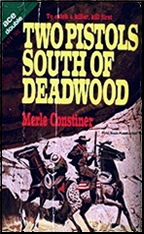Sun 25 Nov 2018
Western Review: MERLE CONSTINER – Two Pistols South of Deadwood.
Posted by Steve under Reviews , Western Fiction[10] Comments
MERLE CONSTINER – Two Pistols South of Deadwood. Ace Double G-674, paperback original, 1967. Published back-to-back with No Man’s Brand, by William Vance.

While writing for the pulps in the 1940s, Merle Constiner’s stories appeared primarily in the detective magazines. He had two long-running series about PIs, the first being the semi-scurrilous Dean Wardlow Rock, aka “The Dean,” whose many adventures were recorded in the pages of Dime Detective. The second was Memphis-based Luther McGavock, stories about whom showed up in Black Mask magazine on a regular basis.
When the pulps started dying out, Constiner was one of the writers who successfully managed the transition over to novel-length fiction. As he did so, however, he made a sudden change of direction and decided to make his mark instead with westerns. In his entire career he wrote but one detective novel, that being Hearse of a Different Color, for the second- or third-rate and hardly prestigious Phoenix Press.
Even so, many of his western novels had elements of detective fiction in them, some more than others. In Two Pistols South of Deadwood, for example, they show up only in a very minor way. When a bank is robbed in Hartsburg (somewhere south of Deadwood), all of trapper Kinney Lampson’s accumulated savings go with it, giving him no choice but to after the leader of the gang, a notorious outlaw named Lucas Gambrell, on his own.
Along the trail he picks up a companion, a man who’s fast with a gun named Gatling. As it turns out, Gatling works for Gambrell, but a friendship between the two develops, eventually leading to a partnership of sorts, and they have several boisterous adventures on their way to the lawless town of Merriman, where Gambrell makes his headquarters.
Kinney is one of those larger-than-life characters that populate western folklore, and Constiner’s sly understated sense of humor makes this book stand out from many other westerns of the era, all of which took themselves a lot more seriously.
From page 25, Gatling happens to ask, hypothetically speaking:
“I’d hate to guess,” said Kinney.
“Well, let’s see,” said Gatling.
“I could use a glass myself, unless it has too many wasps and bluebottle flies and dead spiders in it,” said Kinney.
“They won’t hurt you,” said Gatling.
“I know,” said Kinney. “It’s just that I hate the idea of having to buy them when I don’t really care for them.”
And what happened to Kinney’s money, and does he ever get it back? There are many stumbling blocks to overcome, and some intricate bits of misdirection by Gambrell, of all people, but yes, Kinney Lampson and his new comrade in arms are definitely up to the task.
November 25th, 2018 at 11:00 pm
I believe I have all of Merle Constiner’s westerns, over a dozen novels in paperback. They are among my favorite westerns mainly because of the unusual characters and humor.
November 25th, 2018 at 11:08 pm
You’re right, Walker. You certainly don’t get the “same old, same old” in any of his books. If you have them all, you have a good set of fun to read western adventures
November 26th, 2018 at 12:03 am
It’s amazing how much a touch of humor can keep a book fresh despite the passing of time.
November 26th, 2018 at 12:37 am
After a lifetime of reading I now think what matters most with me is not plot or action but wit, humor, style, and characterization.
November 26th, 2018 at 4:03 am
I can’t disagree with that. I used to read every book I started to the end. I thought it was one of the Rules of Reading. (I’m exaggerating only a little.) You don’t hear about the ones I don’t finish any more, but lack of wit, humor, style, or characterization has a lot to do with it.
November 26th, 2018 at 7:03 am
And so something else I never heard of goes on the Want List. Sometimes I wish you didn’t review so well, Steve
November 26th, 2018 at 2:58 pm
Just doing my daily duty, Dan!
November 26th, 2018 at 3:50 pm
I have yet to read any of Constiner’s westerns but I am an enthusiastic fan of his pulp detective stories, particularly those about The Dean. And I agree wholeheartedly regarding the importance of wit, humor, style, and characterization.
December 10th, 2018 at 1:54 pm
Just started it today, Steve. It’s even better than you said — THANKS!
December 10th, 2018 at 8:13 pm
You’re welcome!